BdP’s governor says the Portuguese have “expectations which simply do not fit the performance of the economy”
"We have expectations which simply do not fit the performance of our economy, and this can only be shifted if we start betting on more and better ways to promote economic growth.", Carlos Costa says.
“It is quite clear that the expectations the Portuguese have about their well-being and equality outweigh by far the producing capacity of the Portuguese economy at the moment”, the governor of the Portuguese Central Bank (BdP), Carlos Costa, said this Sunday at an event commemorating the 30th birthday of Porto’s Business School.
According to the banking regulator, if the goal is to stop living with such “limited aspirations” the only way is to focus on creating “more growth”.
“We have aspirations which simply do not fit the real performance of the country’s economy, and this reality can only be shifted if we start betting on more and better ways to promote real economic growth in Portugal. If we don’t do that, our aspirations will always be limited by our inability to generate the profit required in order to satisfy those needs”, he defended.
According to the Portuguese central bank’s leader, we are nowadays aware of what separates the Portuguese economy from those economies ahead in the game: productivity makes the difference, more precisely productivity per hour, instead of the number of hours spent at work, alongside human resources qualification, including the qualification at the manager level.
Human resources in Portugal are shifting, and hiring people with higher competencies is a rising tendency in the country, but according to the governor of the BdP “there is a considerably high gap if we compare ourselves with other European countries’ performance, which means we still have to improve the formal education level of our workers, especially older employees with fewer qualifications”. “If that doesn’t happen, we will witness a progressive disqualification of our workforce, which is especially prejudicial for themselves but also for the economy in general, ultimately meaning a new burden on welfare, as the state has to work towards social cohesion, which also has an impact for public finances”.
“This will generate pressure on the budget, the society, and naturally will promote human capital flight from Portugal to other economies”, he added, arguing that the qualification of human resources can’t only focus on increasing the number of school years. If that accumulation of competences does not meet the labour market needs, there will be “social unrest, a waste of resources and losses for the country’s public finances”.
The problem with the Portuguese economy is that “it is rather more focused on the non-tradable sector”, and he foresaw as urgent that the Portuguese economy starts working harder on their tradable sector, as this is an indispensable condition to guarantee a continued economic growth, and more job creation, in the country.
Carlos Costa also added that the behaviour of the Portuguese exports was key in avoiding a “painful structural adjustment ” and a “slower economic growth”, as for instance, our Greek counterparts experienced.




